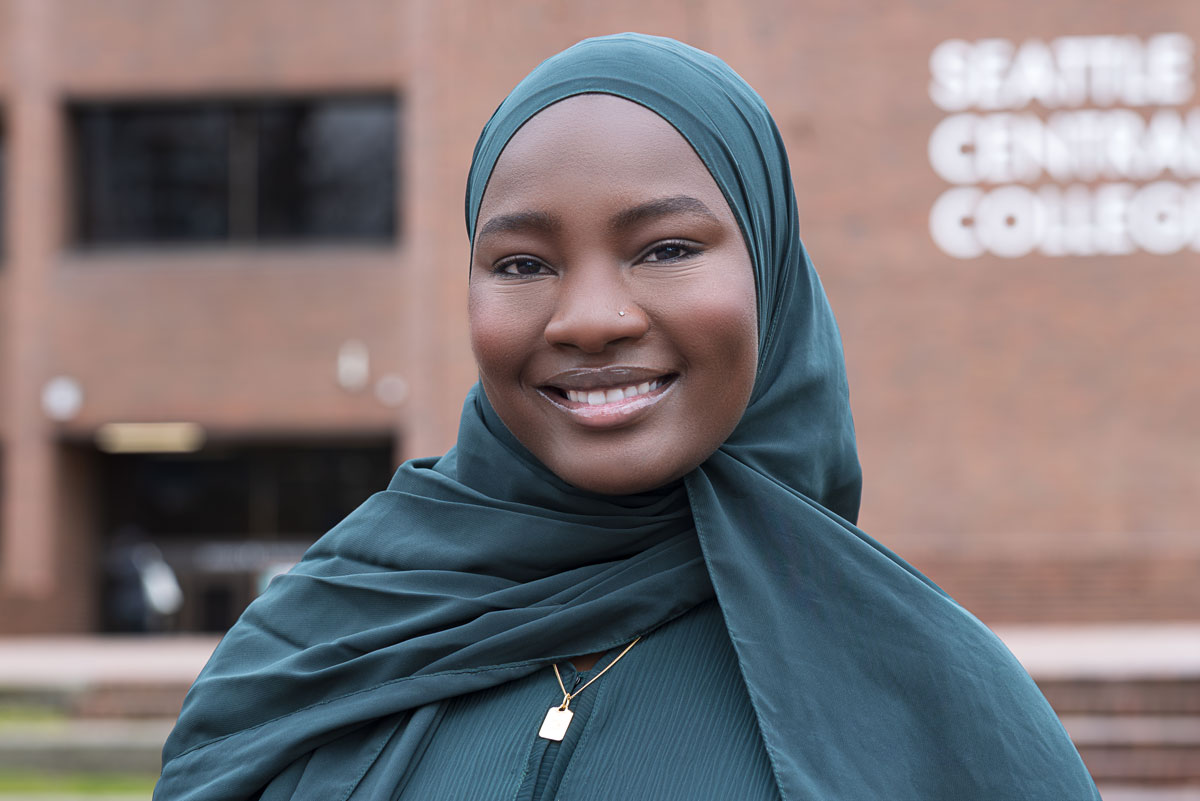Latifa Souleyman
“A promise I made to myself is to be a better version of myself, to be an example for my siblings and to be resilient and spread kindness in the world.”
Seattle Promise Alumna
Associate in Nursing DTA/MRP Graduate, Seattle Central College
2018 Garfield High School Graduate
ABOUT LATIFA
Latifa Souleyman’s college experience was one continuously reassured and guided by Seattle Promise and its support staff. As a first-generation college student, she was grateful for the routine check-ins with advisors as they pointed her toward resources for challenges she faced both in and out of the classroom. With that steady support behind her, she knew that college was possible for her, and everyone else, to seek a purpose-driven career that makes the world a better place.
Early Childhood
Souleyman’s story also reflects the program’s commitment to uplifting people from historically marginalized communities. In 2003, her family fled their home in Bindisi, Sudan during the War in Darfur for better opportunity. Over the course of six years, her and her family sought refuge in Chad, Kenya, Burkina Faso, France and New York before settling permanently in Seattle. She entered the Seattle Public School system as a fourth grader without any English knowledge, making her educational journey especially challenging.
Path to Higher Education
As the oldest child in a family of 12, the promise of a tuition-free college education was invaluable, let alone the extensive support she received to continue her education beyond Seattle Central College. After completing her associate degree and utilizing Promise’s advising staff, she has successfully transferred to Seattle University, where she pursues a Bachelor of Science in Nursing.

IN THEIR WORDS
About Seattle Promise’s advising opportunities:
“The quarterly check-ins felt like counselor appointments and from there it was like, ‘you have to maintain a 2.0,’ and in the classes that you were struggling, they would help you find resources like tutoring or any one-on-one [help] like, for example, the writing center by the library.”
“It wasn’t just quarterly check-ins either, they were doing them consistently throughout the quarter. That way you could get help either financially or even through your peers to find people that you can study with.”
On Seattle Promise’s academic support:
“Sometimes you’d have a struggle in a class and Seattle Promise was able to help you from there with faculty to connect in meetings. Even if you were having trouble with faculty themself and you’re not connecting in a way, they’re able to help you to have those one-on-one meetings to maneuver around the difficult situations from there. That way you’re able to pass those classes while also earning the grade that you know you deserve.”
On receiving non-educational support from the program:
“My parents came here for better opportunities. Education for them was a huge thing. Back home, you had to pay for education from K-6 or from K-12 all the way up to university. It was a big thing where you had to find education funds and also meal supplies. It’s much different here, [Seattle Promise] is able to help you find those resources if you struggle with meals at home, if you have housing issues and if you need clothing, they’re able to help you find those outside resources.”
On Seattle Promise’s impact:
“It benefits not just me, but it’s being an example for younger people that after high school you don’t have to work just for the money itself. You’re working to get a career to do what you love and you’re able to earn money from it. You don’t want to struggle with the financial burden from paycheck to paycheck, but you’re able to make a career that you love.”
On being a role model to her siblings:
“It's being that example for them that education is an open door. There’s resources out there that are able to help you and people will help you along the way. You are not alone in this.”
On her future aspirations:
“I want to be the one person where I’m able to go back home with my degree and open a clinic or help individuals with prevention. Like teaching people about diabetes or nutrition where they’re able to learn of opportunities to take care of themselves, but also for their families.”